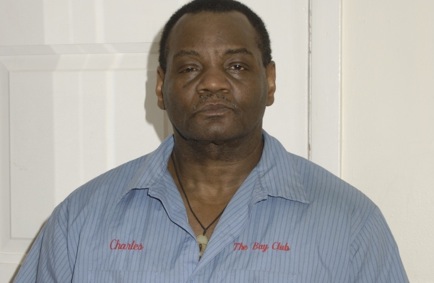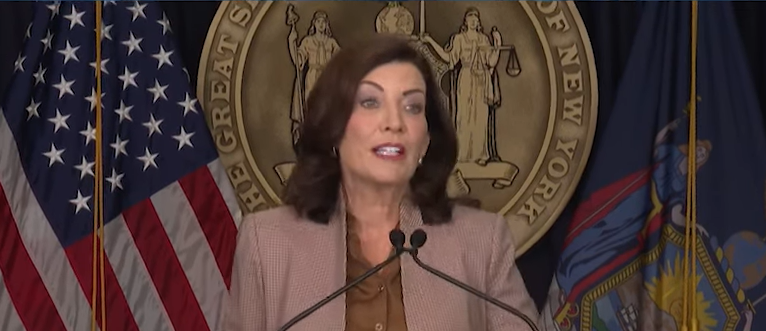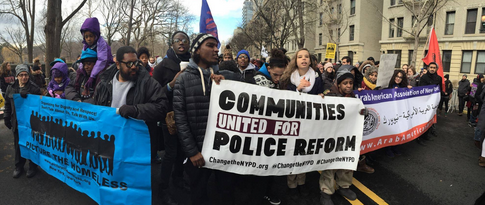Charlie Price, fired after 30 years of alleged hostile work environment and racism. Photo: Nate Adams
[Investigative Report]
This is Part One of a Series
When Charles Price joined The Bay Club 30 years ago as a porter Ronald Reagan was in the White House. Today the United States has a Black president; yet, Price says, the more things change the more some things stay the same.
Over the years, the New York State Division of Human Rights has issued multiple probable cause determinations against the Bay Club and Price’s union, SEIU 32BJ, after he filed complaints that he was regularly subjected to racist epithets — referred to as a “nigger” and “stinking dirty nigger” for decades by co-workers and managers.
Price was a porter at the Bay Club a two-building luxury condominium complex with more than 1,000 units in Bayside, Queens, New York, on 14 acres of land; a third building serves as a recreation and fitness club. The complex has a basketball court, tennis courts, and pools.
John B. Lovett & Associates has been the managing agent for 30 years. Over the same time frame, Price was the only Black employee in a maintenance department staff that had more than 40 workers.
Price says managers at the Bay Club ignored his complaints as did his own union 32BJ; the Human Rights division issued several probable cause determinations against the union as well, dating to at least 2011.
People familiar with the matter say the racist verbal attacks against Price, and the retaliation, was because management at the Bay Club wanted to coverup its role in alleged rampant corruption that the porter and some unit owners were instrumental in exposing. They point out that as a result of Price’s courage and the work of other unit owners, the District Attorney in Queens County is now investigating the corruption allegations.
Motive To Cover Up Alleged Corruption And Theft: Price was seen as an enemy by management once some higher-ups realized that their illegal and lucrative source of income was threatened because he wouldn’t play along, says a person familiar with the matter.
The alleged criminality included: steering of contracts to preferred vendors, including Touch of Class, a company owned by a nephew of the Bay Club’s Superintendent; rigged bids, complete with submission of proposals by fictitious companies so that a designated vendor could win; submission of forged bids; payment of kickbacks by vendors to win work; outside work by maintenance staff on company time, using Bay Club supplies and then sharing proceeds with maintenance staff managers; alleged drug use by employees on work premises; and, many other alleged transgressions.
Rebellious unit owners finally forced the Bay Club’s board of directors to hire a forensic accountant and private investigative firm, Thacher Associates, in May 2011, to conduct an independent investigation into the allegations of rampant corruption that Price and others were complaining about. “I just wanted to protect the residents, that’s all,” Price says.
Price was one of the several employees who spoke to people at Thacher.
Thacher, the firm hired for the investigation, was friendly with at least one board member, people familiar with the matter, say. The board bypassed the unit owners and spent nearly $500,000, according to people familiar with the matter. Thacher treated the board with kid gloves and didn’t rigorously examine its misconduct but still recommended that both the Super, John Wambser, and then Assistant Super Gary Brenner, be fired, according to the persons familiar with the matter.
The Board then voted to fire Wambser but told unit owners that he had resigned. He was given a “nice” financial settlement, one person familiar with the matter says.
Why Price Was Targeted: Brenner was then promoted to Super. Now he was in a position to make the life of a known whistleblower, Price, even more miserable. “This was the ultimate insult to all the unit owners and whistleblowers who had come forward,” says one person familiar with the matter. “Getting rid of Price became the number one goal. This would also send a clear message to all the other workers and whistleblowers.”
Price endured racist assault and mistreatment by “people who were ripping off the Bay Club for years,” this person says. “He stood up for the unit owners and spoke openly to the unit owners about the corruption. They had to make an example out of him and do everything possible to discredit and fire him.”
Thacher interviewed scores of witnesses who provided information on the alleged corruption. “We note that the Bay Club’s contract with Lovett for management services provoked the most concern amongst unit owners with whom we spoke,” Thacher wrote in its report of the investigation. “The perception they expressed to us repeatedly was that as long as Lovett remains as managing agent, things will never change.”
Even as he continued to help expose the alleged corruption at the Bay Club, Price says he was fighting off constant threats and abuse.
Price told the Human Rights division in one of his earliest complaints that after Barack Obama was elected president in 2008, the Bay Club’s Super, Wambser, said someone should “put a bullet in his head,” referring to the President Elect. Wambser was angry because he believed, correctly, that Price, like many Black people, at the time, was elated by the historic vote, he says.
Price says he reported Wambser’s comment about Obama to Eugene Gardner, the general manager at the Bay Club, and then to the Human Rights division.
Was FBI Notified Of Alleged Obama Remarks?: Leticia Theodore-Greene, a spokesperson for the Human Rights division declined to respond when asked whether Wambser’s alleged comment about Barack Obama was ever reported to law enforcement authorities by her agency. Deborah L. May, a complaint division representative who also handles Price’s case at the Human Rights division, declined to comment.
Elaine Kim, spokesperson for 32BJ also would not comment on whether the union reported to the authorities the alleged remark by Wambser, who is no longer at the Bay Club.
Antonio Casas, a lawyer with Windels Marx Lane & Mittendorf LLP, who represents the Bay Club, also declined to say whether the firm reported the alleged Wambser comment. The matter is “under litigation” he says.
Howard Simon is the lead attorney at the firm who has represented the Bay Club for 30 years and is in charge of the case.
A spokesperson at the Federal Bureau of Investigation (FBI) didn’t return a phone message seeking comment on the matter. The spokesperson also didn’t respond to written questions submitted via e-mail message.
Bay Club Witnesses Corroborate N-Word Allegations: Price in his complaints to the Human Rights division alleged that in addition to Wambser, and the current Super Brenner, he was also constantly referred to as a “nigger” by Alfonso Sanchez, the head porter. Sanchez is also no longer at the Bay Club, departing around the time that the Human Rights division issued the probable cause determinations.
Price says the managers encouraged the Latino workers not to call him by name but to use the racial epithet.
One of Price’s several complaints of discrimination and retaliation was filed on May 19, 2010 against The Bay Club and 32BJ, and subsequently the Human Rights division issued a probable cause determination after investigators spoke with witnesses who corroborated the allegations, records show.
One witness, who worked at the Bay Club, told a Human Rights division investigator, Stuart R. Palatnick, that in addition to being called “nigger” to his face when the Super came looking for Price he would ask, “Where’s the nigger at?”
Records show that Gardner, the general manager, also confirmed to investigators at the Human Rights division that Price had indeed complained to him about the use of the “inappropriate” language on several occasions.
When contacted by The Black Star News, Gardner declined to comment, saying the matter is being litigated.
“Not true,” Gary Brenner, the current Super said, when reached by telephone and asked if Price was called a “nigger” and “dirty stinking nigger.”
“Impossible,” he added, when informed that Gardner had confirmed the use of the “inappropriate” language to the Human Rights division. It’s unclear whether Brenner has read the case documents.
Alleges Frame-Up For Arrest: Six months after Price’s May 19, 2010 complaint, as part of the on-going alleged retaliation, managers saw a work-related accident as an opportunity to frame him, he says.
On November 3, 2010, while pushing a heavy garbage container up a sharp incline, his co-workers suddenly let go and Price was forced to summon as much strength as he could and even then he barely managed to push the container to the top, he says. However the container struck a co-worker, Luiz Munoz, who was injured and the Super and general manager instructed the co-worker to file criminal assault charges against Price, he says.
Price was arrested and charged with assault in the third degree. Later the Bay Club suspended him without pay for two weeks, claiming he pled guilty to a crime.
This was untrue. Price could not afford an attorney for a drawn-out trial and entered into an agreement that involved a procedure called Adjournment in Contemplation of Dismissal (ACOD), with the Queens County DA’s office. He did not plead to a crime and all charges were dismissed on July 20, 2012, records show.
Price says in fact he had been in danger of having the container roll back over him.
“I was a good employee and the hardest worker,” Price says. “They treated me worse than an animal.”
Price recalls that one time, in an effort to make his life miserable, he was forced to clean a laundry-room whose floor had never been touched with soap in decades. “I made it spotless clean,” he says with pride.
He also had good relations with many of the residents and unit owners, he says. He recalls finding an elderly Jewish holocaust survivor who had collapsed in one of the hallways. “I held him down until the ambulance arrived and gave him my jacket to use as a pillow. I thought he’d cracked a rib and was afraid he could die from internal bleeding if he got up,” he says.
Another time, Price was at the right place when an elderly woman who had played tennis in the heat collapsed from exhaustion; Price grabbed her just before she hit the floor, he says.
A Supreme Court Justice Intervenes: In order to block the Human Rights division from proceeding with the case, The Bay Club’s lawyers filed an Article 78 Petition in State Supreme Court in Queens, seeking to force the matter into arbitration.
On September 12, 2012, Judge Robert J. McDonald signed a stipulation ordering arbitration after which the “principle of res judicata” would apply; meaning the matter could not be re-litigated. The Human Rights division stayed its own proceedings.
Arbitration meant 32BJ, which was also a respondent on Price’s complaints, would now technically face off against the Bay Club and “represent” Price’s interest, under the Collective Bargaining Agreement (CBA) between the union and employer. “So one of the defendants would be representing my interest. Is this a big joke?” Price said.
Records show that seven months before Judge McDonald’s order, Erin Sobkowski, a senior lawyer for the Human Rights division filed papers on February 10, 2012 opposing The Bay Club’s attempt to force the case to arbitration.
Sobkowski cited cases where the EEOC was still allowed to pursue discrimination cases in court even after the worker was compelled into arbitration under a union’s collective bargaining agreement with the employer. (In New York State, where the EEOC and the Human Rights division share jurisdiction over a complaint, it’s filed with both agencies, as in Price’s case).
Moreover, Sobkowski wrote, the “Division is not a party to any agreement to arbitrate claims,” and she offered an example: “In EEOC v. Waffle House, Inc., 534 US 279 [2002], the United States Supreme Court held that although an employer and employee had entered into a valid agreement to arbitrate all claims, the EEOC, as a non-party to the agreement, could not be compelled to arbitrate its complaint nor was it barred from pursuing litigation on behalf of the charging party.”
“Although barred from initiating a private judicial action, individuals subject to arbitration agreements are still free to file charges of discrimination with the Equal Employment Opportunity Commission,” Sobkowski continued, citing another case. “This applies with equal force to union members subject to mandatory arbitration provisions within a collective bargaining agreement.”
“Like the EEOC, the Division was created to vindicate the public interest by eliminating and preventing unlawful discrimination in employment,” Sobkowski added, “and no agreement between private parties can deprive the Division of its independent statutory authority to investigate and act upon any complaints of discrimination.”
Sobkowski noted that in addition to the Bay Club, the union 32BJ SEIU was also a respondent. “There has been no allegation that SEIU 32BJ has an agreement to arbitrate discrimination claims against it by its union members,” Sobkowski wrote. “Even if the Court determines the Division is prohibited from proceeding on the complaints against the Board of Managers of the Bay Club, the Division cannot be prohibited from proceeding on the claims against SEIU…”
The Union Blames The Employer: How eager was 32BJ to fight on behalf of Price?
Records show that the union seemed more interested in extricating itself from the whole case, arguing that the probable cause determination should have been only against the Bay Club, not the union.
In December 13, 2011, Katy Dunn, 32BJ’s associate general counsel had written to Caroline Downey, general counsel at the Human Rights division about the fact that Eugene Gardner, the manager at The Bay Club, at a meeting with investigators at the Human Rights division “acknowledged that complainant complained repeatedly of being referred to inappropriately…”
The letter then added, referring to the conclusion that the investigation by Human Rights division had established, which was that, “While at work, Mr. Price was called a n-gger and that such an epithet can be the basis for finding a hostile work environment.”
Dunn then insisted The Bay Club, not the union, was responsible for creating the hostile work environment. “Mr. Price has never alleged, nor could he, that anyone at the union used a racial epithet,” Dunn continued and added: “Rather, he alleges that epithets were used by supervisors employed by his employer over whose conduct the union has no control and bears no responsibility.”
Price Is Finally Fired: Price had survived several suspensions without pay, including one for 14 months in 2003 on what he says was “trumped up” allegations by management that he had “taken a swing” at Brenner, who was then the Assistant Super.
Finally, this year, on January 29, Price was fired from the Bay Club.
The employer claimed two tenants, Dawn Marshon and Larry Erber, had filed several complaints about his “harassing” behavior. Price says they are again trumped up allegations. He was in fact helpful to Marshon in the past, even securing her entry into New York Fashion Week through a photographer whom he knew.
Price says he was fired after he had helped Erber, who has difficulty walking, from the building to the gate about 50 yards away from his post. “He said my work duties did not call for me to help residents walk to the gate,” Price says, referring to Brenner, who confronted him in the presence of Erber. “Now they use that as the lame excuse to fire me? They just made Erber lie against me.”
Price filed another discrimination and retaliation complaint and the Human Rights division issued another probable cause determination.
Price Denied Unemployment Insurance Benfits: Price says he believes the decision to fire him quickly was also made because several Bay Club residents had recently met with an assistant district attorney at the Queens County DA’s office to provide information about the alleged criminality that was only partially examined by Thacher two years ago. “I was not the only one, other whistleblowers have been speaking with the DA,” he says.
When contacted earlier during reporting for this article Kevin Ryan, the spokesperson at the Queens County DA’s office wouldn’t confirm or deny the existence of an investigation or meetings with the Bay Club residents.
The Bay Club told the New York State Department of Labor that Price was “fired for cause” even though his numerous alleged discrimination and retaliation cases have yet to be adjudicated.
“You were discharged on 1/29/13 for continuing to harass and threaten tenants and management. You received prior warning for your actions and knew or should have known your continued objectionable behavior was detrimental to the employer’s interests and would lead to discharge,” the letter from the NYS Labor department rejecting his unemployment claim, states.
The Bay Club’s lawyer, Casas, declined to comment when asked why the employer blocked Price from collecting unemployment insurance.
32BJ’s Elaine Kim, says, “As for Mr. Price’s unemployment insurance, he should take the matter up with the Department of Labor – the union does not represent members or former members with respect to unemployment insurance claims.”
“They are trying to starve me to death to surrender,” Price says.
The August 15 “Arbitration” Proceeding: A few weeks ago Price was summoned to the arbitration hearing at the Realty Advisory Board on Labor Relations (RAB), in Manhattan.
He met and spoke several times with a union lawyer, Brent Garren, who told him he would be representing him, he says.
RAB’s website describes it as “a multi-employer association serving the real estate industry in New York City, Long Island, Westchester, Connecticut and Northern New Jersey.” The company represents the interests of members in the region, including the major real estate companies such as Lovett & Associates, managers of the Bay Club.
In addition to Erber and Marshon, the two residents, others who testified from the Bay Club were: Brenner, Gardner, and Barbara Morley, the Board President.
Weeks before the arbitration proceeding, Price had urged the union lawyer, Garren to summon several witnesses, including residents at The Bay Club on his behalf. Garren declined, verbally and in writing.
Garren also declined to ask in advance for a postponement. In any case, he told Price, he actually represented 32BJ, not Price.
This reporter accompanied Price to the arbitration proceeding, and Garren objected to his presence. The arbitrator, Gary Kendellen, then told the reporter the arbitration was “private” and “closed.”
The transcript of the proceeding shows that Price also told Kendellen that he had come against his will and that he had wanted a postponement so he could call witnesses on his behalf.
Later, after the arbitration proceeding, Garren the union lawyer told Price that the arbitration ruling would likely go against him. Although the Bay Club’s witnesses were not credible, Price did not have any witnesses present to rebut the testimony, Garren said.
Garren did not respond to an email message from The Black Star News seeking comment on why he didn’t call any witnesses. After all, some had
testified to the Human Rights division, corroborating Price’s allegations about the racist abuse and retaliation. Garren also didn’t say whether multiple separate probable cause determinations can actually be rolled into one arbitration before earlier grievances had been resolved.
32BJ’s Kim also wouldn’t answer this question; the Human Rights division’s Theodore-Greene also declined to respond.
Judith Padow, deputy general counsel at 32BJ, referred a voicemail message from The Black Star News with the same inquiry to Kim, as did Mike India, grievance representative at 32BJ.
Price Challenges The Testimonies: “The testimony against me was not credible,” Price says in an interview.
Erber claimed he was afraid of Price because sometimes when he emerged from Delis he would find him standing there waiting for him to ask for tips about which stocks to purchase. (Erber is also reportedly a close friend of the Super Gary Brenner’s brother, Scott Brenner, who works at the Bay Club, according to a person familiar with the matter.)
Price says Erber also played the race card. The transcript shows that at one point Erber says, because of Price, “it’s a nightmare living here. This is not the projects, we pay good money, and it feels like it’s gangland in a sense. Charlie is the ruler out here, taking the law into his own hands…”
The transcript shows Marshon’s own testimony as rambling, inconsistent, and occasionally unintelligible. She claimed she felt threatened and that Price had made “sexual” comments. Marshon did admit that Price helped her get into Fashion Week.
Records show that after Marshon had complained to Gardner about Price, he had denied the allegations and offered to take a lie detector test and pay for half of it. Marshon filed a police report saying one time while speaking on his cell phone and walking towards her direction, Price had said “I’m going to get you” and that she had felt threatened.
“She has no credibility,” says a person familiar with the matter. “If the New York Police Department did not find her to be credible is Eugene Gardner and the John B. Lovett & Associates management company now an independent police force? I want to know what the people who testified against Charlie do for a living.”
Brenner and Gardner, both testified about Price’s alleged insubordination, complaints from residents, and the alleged “swing” he took at Brenner 10 years ago.
We’re Not In Florida Anymore: After the arbitration proceeding, Price received a letter from the Human Rights division saying a pre-hearing conference call had been scheduled for his case, on October 2, before Administrative Law Judge Martin Eranzo Jr.
When The Black Star News called the Division and spoke to Deborah L. May, the complaint division representative, she said that as far as she knew the hearing was on schedule. But Price received a letter the next day by overnight mail from the Human Rights division’s chief administrative law judge, Lilliana Estrella-Castillo, saying the pre-hearing conference call had been cancelled.
The most recent probable cause determination was issued on March 5, this year, after Price’s termination. On March 11, Judith Padow, the 32BJ union lawyer again wrote to Downey, general counsel at the Human Right division, asking that the probable cause determination be discontinued.
The division denied the union’s request on July 31, 2013. The August 15 arbitration did not address this matter. This technically means that regardless of the outcome of the arbitration there will still stand probable cause determinations against 32BJ and the Bay Club.
Price, with no paycheck and blocked from collecting unemployment, has been draining his savings. He also lost his health insurance coverage.
He says he knew things were going to be very different when the former Super, John Wambser, arrived with his family from Florida, a few months after he started working at the Bay Club 30 years ago.
Price says one day he went to Wambser’s apartment to pick up a two-way radio after reporting to work. He says Wambser’s son, who was then just a boy, came to the door and then said, “Mom the nigger’s at the door.”
He says the mother apologized for the son’s comments and that after she closed the door, while he was still outside on the other side, he overheard her say: “We’re not in Florida anymore. You can’t use that word in New York.”
Anyone with documented information about similar alleged abuses please contact [email protected]







